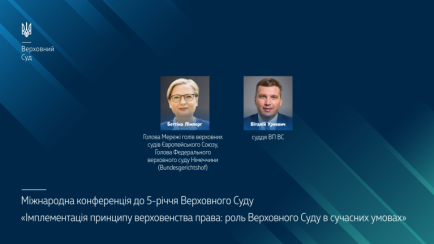Contact center of the Ukrainian Judiciary 044 207-35-46

The Supreme Court seeks to achieve the resilience of the rule of law in its case law. That is why it is so important to study the best practices of implementing this fundamental principle in Europe. This was highlighted by Judge of the Grand Chamber of the Supreme Court Vitalii Urkevych, when he was giving the floor to Bettina Limperg, President of the Network of the Presidents of the Supreme Judicial Courts of the European Union, President of the Federal Court of Justice of Germany (Bundesgerichtshof), who delivered a special report at the international conference.
Bettina Limperg thanked for being invited to speak at the event and expressed her gratitude to the brave Ukrainian people for their courage, wisdom and will to ensure that the vicious war of aggression does not turn the country off its path to Europe. She also congratulated the Supreme Court on joining the Network of the Presidents of the Supreme Judicial Courts of the European Union since the beginning of this year.
According to her, the war against Ukraine has dispelled Europeans' dreams of everlasting peace and plunged them into the nightmare of a brutally waged war. This new reality has led to new perspectives and a new unity of allies against an external enemy. The speaker is convinced that international law has to address many pressing issues, and to this end, numerous pieces of evidence are already being collected for future war crimes trials.
However, the speaker realizes that the task that the entire civilized world is currently facing, unfortunately, cannot be solved solely by legal instruments. At the same time, Bettina Limperg is convinced that future conflicts can only be prevented by law.
She reminded the audience that after the Second World War, it was due to legal instruments that the worst injustices were punished. The post-war European system, in which the rule of law plays a prominent role, has proven to be effective. For this reason, in her special report, Bettina Limperg focused on the cooperation of courts within the European legal order established on the basis of European treaties.
The speaker stressed that a new legal order was essential to consolidate the fundamental freedoms of free movement (of goods, services, capital and persons). In addition to substantive and procedural rules, there arose a need for a judicial body that could take care of the interpretation of European legislation. And the EU Court of Justice, which celebrated its 70th anniversary last year, has become such a guardian of the European legal order.
Speaking about the dialogue between national courts and the Court of Justice of the European Union, Bettina Limperg focused on the preliminary ruling procedure under Article 267 of the Treaty on the Functioning of the European Union. This procedure involves questions and answers on the interpretation of European law without the possibility of the EU Court of Justice to decide on the merits of the proceedings. Instead, it is up to the national court to incorporate the response received into its adjudication of the case and to make its own judgment. Thus, the judgment of the EU Court of Justice is not a decision of the last instance in the traditional sense, but an intermediate procedure that is attached to the proceedings as an expert opinion. The speaker added that German courts often resort to the preliminary ruling procedure.
According to her, the discussion about the final court decision has recently become more relevant. The EU Court of Justice has made it unmistakably clear that a final binding judgment cannot be issued contrary to the case law of this court. National courts should make every effort to reach a consistency in their interpretation of European law. She is convinced that the future of the European rule of law depends on European jurisdiction. European legislation, EU legislation, has become the new key to the success of national law in the member states, even in the area of constitutional law.
As Bettina Limperg summarized, the war of aggression against Ukraine proved that global challenges could only be confronted in larger alliances and that meaningful, sustainable solutions could only be achieved in legal communities.
After the keynote speech, Vitalii Urkevych reminded that on January 19, 2023, the European Parliament adopted a resolution in support of the establishment of an international tribunal to prosecute those responsible for the crime of aggression against Ukraine. He asked the foreign guest whether there was a discussion among German judges and lawyers about organizing the work of this special tribunal.
Bettina Limperg assured that such a discussion was underway, though not very extensive. It is important to note that her German colleagues fully support the idea of establishing an international tribunal and emphasize the need to collect proper admissible evidence and information that will be used for future criminal proceedings.
The international conference "Implementation of the Rule of Law: The Role of the Supreme Court in Modern Conditions", dedicated to the 5th anniversary of the Supreme Court, was organized by the Supreme Court in cooperation with the Council of Europe project "Support to Justice in Ukraine in Wartime and Post-War Period".